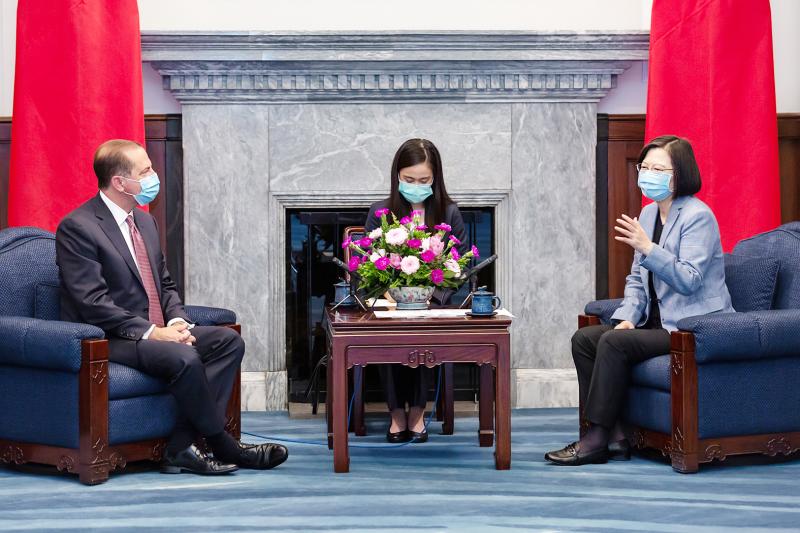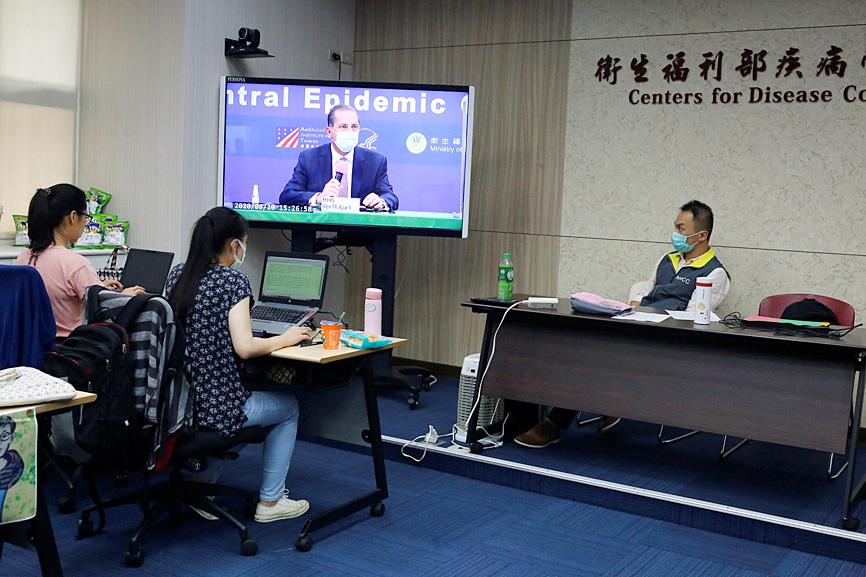President Tsai Ing-wen (蔡英文) yesterday met with US Secretary of Health and Human Services Alex Azar in the highest-level official meeting between the two nations since 1979.
“It is a true honor to be here to convey a message of strong support and friendship from [US] President [Donald] Trump to Taiwan,” Azar said during the open portion of his courtesy call to the Presidential Office, which was streamed live online before Tsai and Azar held a closed-door meeting.
“Taiwan’s response to COVID-19 has been among the most successful in the world, and that is a tribute to the open, transparent, democratic nature of Taiwan’s society and culture,” Azar said.

Photo: EPA-EFE / Presidential Office handout
The US has expressed its admiration for Taiwan’s democratic success in tangible ways, such as signing legislation to strengthen the bilateral partnership and opening a new American Institute in Taiwan (AIT) complex in Taipei in 2018, Azar said.
The focus of his trip was to highlight Taiwan’s success in combating the COVID-19 pandemic and to build cooperation to prevent, detect and respond to health threats, he said.
Tsai said that she hoped the US delegation’s visits to various government agencies and institutions would give them a substantive view of Taiwan’s efforts to contain the COVID-19 outbreak.

Photo: Ann Wang, Reuters
“The visit also provides us an opportunity to speak face-to-face on issues of importance to both sides and find a direction to future cooperation,” Tsai said.
She thanked the US for recognizing Taiwan’s contribution to the global coronavirus response and for supporting its efforts to expand its international participation.
She also raised the issue of Taiwan’s exclusion from the World Health Assembly (WHA), which has been largely due to China’s objections.
“The decision to bar Taiwan from participation in the WHA is a violation of the universal right to health,” she said.
Azar, who arrived on Sunday, is on a four-day visit, the first by a US Cabinet member in six years, and he is the most senior US official to visit since Washington and Taipei severed formal diplomatic ties in 1979.
At a press briefing prior to his meeting with Tsai, Azar told reporters that “this visit is about Taiwan,” in response to questions about US-Taiwan-China relations and Beijing’s anger over his visit.
“This visit represents an acknowledgement of the United States and Taiwan’s deep friendship and partnership across security, economics, healthcare, and democratic open transparent values,” he said.
“This visit is about reaffirming our connections with Taiwan and the important role Taiwan plays in public health,” he added.
In his opening statement at the briefing, Azar said that his visit was “consistent with the [US’] long-standing ‘one China’ policy and past engagement with Taiwan.”
In related news, Chinese Nationalist Party (KMT) Chairman Johnny Chiang (江啟臣) said that the Tsai administration should be careful in its handling of external affairs, particularly in light of the deteriorating US-China relations.
In other developments, Air Force Headquarters said two Chinese warplanes briefly crossed the median line of the Taiwan Strait yesterday morning.
A Shenyang J-11 and a Chengdu J-10 briefly crossed the line into Taiwan’s side at about 9am, but retreated after Taiwanese patrol planes issued radio warnings, it said.
There was no cause for public alarm, and the military is continuing to closely monitor the airspace and waters around Taiwan, the headquarters added.
Yesterday’s incursion was the third time that Chinese People’s Liberation Army aircraft crossed the median line since March last year, Ministry of National Defense data showed.
Yesterday’s action was a protest by Beijing against the improvement of US-Taiwan relations, as demonstrated by Azar’s visit, Democratic Progressive Party Legislator Wang Ting-yu (王定宇) said.
The move was also intended to appease Chinese Communist Party (CCP) “warmongers” and was a sign of “tremendous stupidity on the part of the CCP. There is absolutely no good in it for them,” Wang said.
Additional reporting by Aaron Tu

The Central Election Commission has amended election and recall regulations to require elected office candidates to provide proof that they have no Chinese citizenship, a Cabinet report said. The commission on Oct. 29 last year revised the Measures for the Permission of Family-based Residence, Long-term Residence and Settlement of People from the Mainland Area in the Taiwan Area (大陸地區人民在台灣地區依親居留長期居留或定居許可辦法), the Executive Yuan said in a report it submitted to the legislature for review. The revision requires Chinese citizens applying for permanent residency to submit notarial documents showing that they have lost their Chinese household record and have renounced — or have never

A magnitude 5.6 earthquake struck off the coast of Yilan County at 12:37pm today, with clear shaking felt across much of northern Taiwan. There were no immediate reports of damage. The epicenter of the quake was 16.9km east-southeast of Yilan County Hall offshore at a depth of 66.8km, Central Weather Administration (CWA) data showed. The maximum intensity registered at a 4 in Yilan County’s Nanao Township (南澳) on Taiwan’s seven-tier scale. Other parts of Yilan, as well as certain areas of Hualien County, Taipei, New Taipei City, Taoyuan, Hsinchu County, Taichung and Miaoli County, recorded intensities of 3. Residents of Yilan County and Taipei received

Taiwan has secured another breakthrough in fruit exports, with jujubes, dragon fruit and lychees approved for shipment to the EU, the Ministry of Agriculture said yesterday. The Animal and Plant Health Inspection Agency on Thursday received formal notification of the approval from the EU, the ministry said, adding that the decision was expected to expand Taiwanese fruit producers’ access to high-end European markets. Taiwan exported 126 tonnes of lychees last year, valued at US$1.48 million, with Japan accounting for 102 tonnes. Other export destinations included New Zealand, Hong Kong, the US and Australia, ministry data showed. Jujube exports totaled 103 tonnes, valued at

BIG SPENDERS: Foreign investors bought the most Taiwan equities since 2005, signaling confidence that an AI boom would continue to benefit chipmakers Taiwan Semiconductor Manufacturing Co’s (TSMC, 台積電) market capitalization swelled to US$2 trillion for the first time following a 4.25 percent rally in its American depositary receipts (ADR) overnight, putting the world’s biggest contract chipmaker sixth on the list of the world’s biggest companies by market capitalization, just behind Amazon.com Inc. The site CompaniesMarketcap.com ranked TSMC ahead of Saudi Aramco and Meta Platforms Inc. The Taiwanese company’s ADRs on Tuesday surged to US$385.75 on the New York Stock Exchange, as strong demand for artificial intelligence (AI) applications led to chip supply constraints and boost revenue growth to record-breaking levels. Each TSMC ADR represents